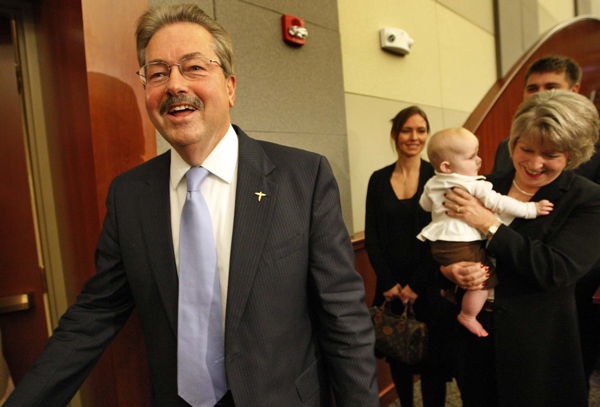Republican Governor Does Education His Own Way

The Article: Iowa GOP Governor Charts Different Course by Catherine Lucey in the Associated Press.
The Text: As his Republican peers in other states search for ways to cut public school funding, Iowa Gov. Terry Branstad is charting a different course. He’s doubling down on education.
Branstad, who was elected in 2010 as part of a resurgent GOP, has made proposals many Republicans would sneer at: raising minimum teacher salaries and offering incentive pay for teachers who take on more responsibilities — all by tapping $187 million in new school funding.
It’s an approach that reflects the lives of Iowa families, who send nearly all of their children to public schools and have felt deeply connected to local districts for generations.
“Ninety-eight percent of the kids in Iowa go to public schools. I went to public school and got a great education,” said Branstad, who likes to note that his daughter is a teacher. “I’m very willing to invest more resources, but I want to invest in an intelligent way.”
Branstad is pursuing his agenda at a time when other Republican governors are focused on slashing education funding, limiting teachers’ power and offering more options for students to attend private institutions.
Last summer, New Jersey Gov. Chris Christie won passage of a plan to make it harder for teachers to get tenure and easier to strip it away. Indiana Gov. Mike Pence supports expanding an already extensive voucher program. And Wisconsin Gov. Scott Walker wants to expand vouchers and freeze school spending.
While Branstad has proposed some of those ideas in the past, his education policies have generally been more moderate. His positions are borne out of both principle and pragmatism. With a split legislature — Republicans control the Iowa House and Democrats the Senate — he must propose a plan that has widespread appeal.
Iowa also is different from other states. The state identifies strongly with its small-town roots. Its 351 school districts enroll about 476,000 students, compared with roughly 32,000 who attend private schools. Nationally a higher percentage of students attend private school, with an estimated 49.6 million kids in public school and 5.3 million in private, according to the U.S. Department of Education.
Iowa does not have a voucher program for private school tuition, and the state has just three charter schools.
Branstad is seeking changes because Iowa schools are slipping. Twenty years ago, the state had some of the top standardized-test scores in the nation, but its ranking has fallen steadily to the middle of the pack. The governor and top aides have spent years researching new programs with input from education advocates.
“I think we have to do something different,” said Davius Eidhal, superintendent of the Ottumwa Community School District. “I understand and appreciate the thinking outside the box. In Iowa, we pride ourselves on education.”
Under Branstad’s plan, minimum teacher pay would rise from $28,000 to $35,000, and senior teachers who take on leadership roles such as mentoring could get annual bonuses ranging from $2,000 to $10,000.
In the rural Maquoketa district, Branstad’s plan could lift starting salaries well above the current level of about $30,700.
“Hopefully, it will attract more people to the profession,” Superintendent Kim Huckstadt said. “Anything we can do to improve the compensation is a positive.”
However, some district administrators have raised concerns that the plan won’t provide enough funding to make all the changes, especially in districts with smaller budgets and fewer students. And the governor has faced criticism from education advocates for announcing that he would not determine a general funding increase for schools until after his plan was approved.
Without extra money, school administrators have said, districts that have endured several lean years might have to make cuts because of rising costs.
“I think the focus on specific programs can be a great benefit for us, and we welcome that focus,” said Dave Benson, superintendent of the Cedar Rapids district, the state’s second-largest. “At the same time, we need general revenue to pay for our programs.”
Last year, the governor pitched a plan that included tougher hiring standards for teachers, new testing for students and a requirement that third-graders demonstrate reading proficiency before being promoted. It also included provisions to make it easier to create charter schools and to make seniority a “minor factor” in layoffs.
In the end, the Legislature approved a bill that included peer reviews for teachers and a provision to let parents choose whether a third-grader who fails to meet reading standards is held back or attends an intensive summer reading program to catch up.
Branstad praised the work of Republican governors in other states, noting efforts in New Jersey and other states to increase “accountability.” He said the divided General Assembly doesn’t “limit his scope” and that he won’t sign on to Democratic proposals that don’t tie dollars to results.
A.J. Spiker, chairman of the Republican Party of Iowa, declined to speak about the specifics of Branstad’s proposal but praised a Republican amendment to the House version of the bill, which would remove state oversight of homeschooling and would allow private schools to be accredited by agencies other than the state.
“Home schooling and private schooling have been proven time and time again to be a very superior form of schooling,” Spiker said.
The governor’s proposal is currently under review in the Legislature, where the House has approved a version that lowers the minimum salary to $32,000 and makes the changes optional. The Democratic-majority Senate approved a beefed-up version of the plan, with additional funding for schools.
“He’s not been a barn burner,” said Russ Whitehurst, director of the Brown Center on Education Policy at the Brookings Institution. “In the other states, the rhetoric is about student test scores and getting rid of bad teachers.”
In Iowa, Branstad said, he’s willing to spend money on public education. “But I want things that are going to improve student achievement.”









